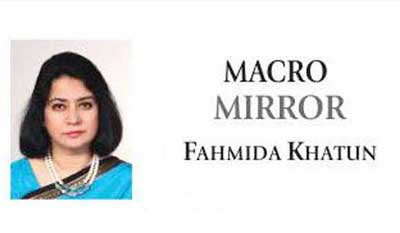Originally posted in The Daily Star on 8 March 2022
International Women’s Day 2022
 Gender equality is still an elusive term not just in Bangladesh, but all across the world, despite so much economic progress and so many measures taken by policymakers. Stereotyped political, social, and cultural values continue to act as barriers for women’s advancement. That’s why, despite the world’s unstoppable progress on various fronts, women in positions of power are still few and far between.
Gender equality is still an elusive term not just in Bangladesh, but all across the world, despite so much economic progress and so many measures taken by policymakers. Stereotyped political, social, and cultural values continue to act as barriers for women’s advancement. That’s why, despite the world’s unstoppable progress on various fronts, women in positions of power are still few and far between.
In Bangladesh, female participation in the labour force has increased to 38.5 percent at present from only four percent in 1974. Women are working in not only agriculture or the export-oriented RMG sector, but also in many non-traditional and emerging sectors at an increasing rate. Higher participation in education has created scopes for securing high-valued jobs for Bangladeshi women. Yet, the number of female participants in these sectors is still low and not many women can reach senior positions in these organisations. Gender gap in managerial positions in Bangladesh is as high as 88 percent, as per the 2021 Global Gender Gap Report of the World Economic Forum (WEF).

We also frequently talk about wage gaps between male and female workers in many sectors, including apparels, construction and agriculture. Over 90 percent of working women have informal jobs. Because of such high informality of their jobs, their income and job security are also low—especially compared to men. According to the WEF, in 2021, women earned only 40.3 percent of the estimated earned income of men in Bangladesh. And the wage gap is true for highly educated executives and managers, too. Women often feel hesitant to bargain for their salary; many also do not know how to bargain. And men feel that women are not the breadwinners of their families, and their income is just “extra.” Such thinking also exists among some women, unfortunately. That’s why the struggle to establish gender equality is not fighting against certain sections of people, but against the system within which such biased values originate and are nurtured.
The strong bias against women works against gender equality in many ways. The Gender Social Norms Index (GSNI) of the United Nations Development Programme (UNDP) in 2020 indicates that globally, 90 percent of men and women are biased against women. The report reveals that social beliefs and norms obstruct gender equality at work, education, and politics. The GSNI also shows that more than 40 percent of people think men can be better business executives, and in case of job scarcity, men have more rights to a job. More strikingly, 28 percent think it is justified for a husband to beat his wife. Though Bangladesh is not among the 75 countries that the UNDP studied, the scenario would not be much different here.
With such biases and barriers in place, it is not easy to achieve gender equality. In 2021, the WEF suggested that it would take 135.6 years to close the gender gap worldwide. The Global Gender Gap Index (GGGI) considers four key dimensions of gender gap: economic participation and opportunity; educational attainment; health and survival; and political empowerment. GGGI also tracks progress towards closing these gaps over time. The Covid-19 pandemic has increased the length of this period from 99.5 years, as estimated in the 2020 WEF report.
So, the journey towards gender equality is a long and difficult one. Many young university graduates enter the job market with a lot of enthusiasm. It starts declining within a few years as they expand their families. Many women end up having to choose between motherhood and their careers. This mid-way departure of female executives reduces the number of capable women in senior positions. When their children grow up and they want to return to the job market, their knowledge becomes obsolete. Employers do not want to hire them with such gaps. Our job market is small where the fresh graduates struggle to secure a job. However, women must stay the course and should not give in. They should acquire new skills and reskill themselves. Many have become small entrepreneurs, even though it is not easy to access finance from financial institutions. Bias also works against women when they go to commercial banks for loans.
Bias against women is ingrained within most of us. Highly educated or less educated, rich or poor, men or women—we all carry similar values when it comes to women’s issues. Therefore, the achievement of gender equality is going to be a long and tedious journey. As we celebrate International Women’s Day this year, we must commit ourselves to treading that arduous and rocky path together.
Dr Fahmida Khatun is executive director at the Centre for Policy Dialogue (CPD). Views expressed in this article are the author’s own.

